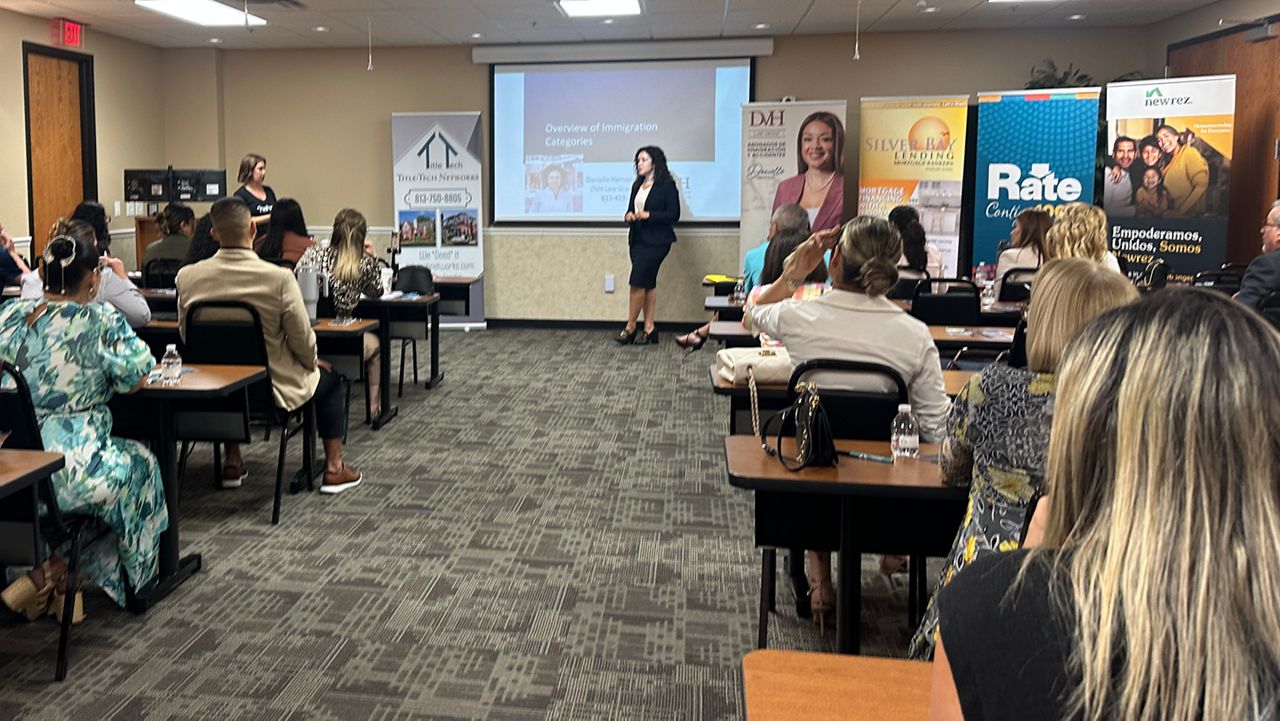TAMPA, Fla. — Fifty-five years ago, the Fair Housing Act was signed into law, and recently, the law was extended to safeguard the LGBTQIA+ community from housing discrimination.
The U.S. Department of Housing and Urban Development has introduced an Interactive LGBTQIA+ Fair Housing Toolkit.
What You Need To Know
- 55 years ago the Fair Housing Act was signed into law and recently, the law was extended to safeguard the LGBTQIA+ community from housing discrimination
- The U.S. Department of Housing and Urban Development has introduced an Interactive LGBTQIA+ Fair Housing Toolkit
- Callen Jones is an inclusive real estate agent who founded the website; https://yournextlgbtqhome.com/ to serve as a starting point for LGBTQ+ home buyers
According to Tampa Bay realtor Caitlin ‘Caleb’ Jones, such resources are currently vital for this community.
Jones has been in the real estate industry for over six years and owns ‘Jones Home Team.’
Business signs for Jones say ‘Caitlin’ while clients refer to them by their preferred name ‘Callen.’
“It’s truly a situation where my license has to be my legal name even to sell under a business,” said Callen. “I have to use what’s on my business license so I don’t get fined.“
Callen’s motto is ‘Inclusive Real Estate’ and they founded the website; https://yournextlgbtqhome.com/ to serve as a starting point for LGBTQ+ home buyers who are looking for guidance and support from inclusive and affirming real estate professionals. Callen serves every one, but 75% of the business involves LGBTQ+ clients.
“I work a lot with trans people,” said Callen. “I just had a meeting last week where we were talking not only about listing the house, but they bought the house and she had one name. She now has a different name. So we need to make sure that the deed transfer is correct. We need to make sure that the wording is correct. Because in Florida, they will often say ‘Husband and Wife’. Well, if you are now legally two women, the deed isn’t going to say ‘husband and wife’ — so making sure we reflect that. On the flip side, when they want to buy a house for trans folks, your social security number is linked to two different identities. So, we need to make sure with the lender, title company, with everybody who is going to be involved in the transaction that they understand here is the information that is going to come up and within that how do we ensure that our clients are being treated respectfully?” said Callen.
Because of new controversial legislation in Florida, like the Parental Rights in Education Act, Callen says clients no longer feel safe.
“The impact of a lot of bills being passed being passed is immediate,” said Callen.
The civil rights group, Equality Florida, issued a travel advisory that states, “Florida may not be a safe place to visit or take up residence.”
“People don’t feel like they can be safe in their employment, restrooms, access to schools,” said Caleb. “Now there’s an influx of people saying, ‘A: We need to leave or B: I don’t know that we are coming anymore.”
Callen says clients feel they are in a difficult position.
“This is the time when people are saying, ‘Do we sell and get a bigger house for our family?’ Or do we continue putting down roots?”
A recent study conducted by Freddie Mac has revealed that the LGBTQ+ homeownership rate of 49.8% falls considerably short of the national average of 65.8%. According to Callen, investing in real estate is the most effective means of building intergenerational wealth.
“The LGBTQ community has huge buying power, but we do have a difference. We have a lot of folks at the top who have affluence and a lot of privilege and we have people at the bottom who are saying that because of their identities, they don’t have access to progressing to truly becoming homebuyers,” they said.
Callen believes that stability is a highly sought-after quality.
“That’s the dichotomy that is sad for me is that people are leaving not because they don’t want to live here, but because people are making decisions that make it feel like they can’t safely live here,” Callen said.
Callen strives to make the buying or selling process smoother, regardless of the decision made.
“I’m facilitating transactions and contracts with people about their goals their needs and their timeline,” said Callen. “Then we fit that into a house, but if it doesn’t have the potential to be what your family needs — then it will be a house, not a home.”
In these homes, LGBTQ+ individuals find safety and security, regardless of the events happening outside of these walls. In observance of National Fair Housing Month, Callen participated in a panel for the employees of Realtor.com. The platform is striving toward greater inclusivity for the LGBTQ+ community by enhancing its resources.









